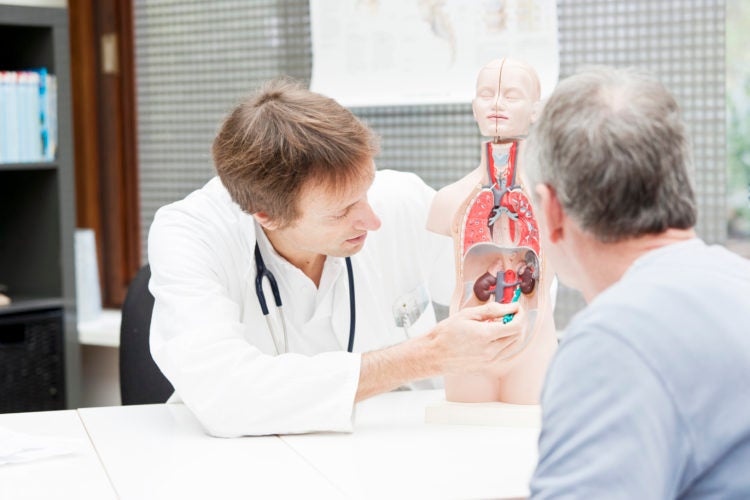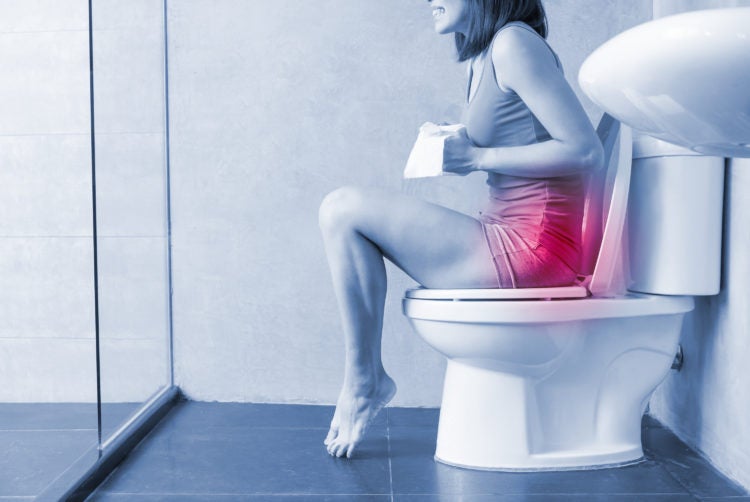-
Tired of Nighttime Bathroom Trips? Talk to Your Urologist About Nocturia

If you wake up two or more times each night to urinate, your urologist may diagnose you with nocturia. Nocturia, also called nocturnal polyuria, might not be dangerous by itself, but it may be caused by an underlying medical condition that needs to be treated. It’s also important to talk to a urologist about nocturia because your nighttime bathroom trips can lead to sleep deprivation, which can cause other health complications.
Your Symptoms
The main sign of nocturia is awakening multiple times at night to urinate. However, you may have other symptoms that may speak to the possible cause of nocturia. To aid in the diagnostic process, it’s important to talk about all of the changes you’ve seen in your health with the urologist. Additionally, let the doctor know if another physician has recently diagnosed you with another condition. The urologist will also need to know how long you’ve been experiencing nocturia, and whether there have been any changes in your lifestyle recently.
The Possible Causes
Two of the most common causes of nocturia are bladder infections and urinary tract infections (UTIs). Treatment involves a course of antibiotics to clear up the bacterial infection. Other medical conditions that can cause nocturia include the following:
- Bladder prolapse
- Diabetes
- Kidney infection
- Tumors in the pelvic region
- Prostate enlargement
- Edema
- Obstructive sleep apnea
- Neurological diseases (Parkinson’s and multiple sclerosis)
Nocturia can also be caused by lifestyle issues. Your urologist will ask whether you consume a lot of fluids in the evening. Alcohol and caffeinated beverages in particular can make you wake up frequently to urinate.
Your Treatment Plan
After reviewing your symptoms, the doctor may want to run a few tests. You may have a urinalysis, blood sugar test, imaging test, complete blood count, or fluid deprivation test. Once the urologist knows exactly what’s causing your nocturia, he or she can develop a treatment plan. If underlying problems like Parkinson’s disease or diabetes are causing the problem, then you may be referred to another specialist.
Nocturia is one of the many conditions our urologists treat here at Urology Associates, P.C. We can figure out what’s contributing to your problem, and we’ll put together a personalized treatment plan that’s appropriate for you. Call (855) 901-1338 to schedule a consultation at one of our urology clinics in Tennessee.
-
Spotlight on the Symptoms of Kidney Cancer

The kidneys are found in the lower back. Each kidney is about the shape of a fist. When cancer cells develop in one or both of these organs, it’s referred to as kidney cancer. Like all forms of cancer, early detection is crucial for the most favorable outcome. Unfortunately, the signs and symptoms of kidney cancer don’t typically develop until the later stages of the disease. If you do notice anything abnormal, talk to a urologist right away. Prompt medical care could save your life.
Urologic Symptoms
Urologic symptoms are changes that involve the urinary system or region. Some patients with kidney cancer report having low back pain on one side that isn’t caused by an injury. It may also be possible to feel a lump or a mass in this area. Hematuria is another possible urologic sign of kidney cancer. This refers to blood in the urine. The urine may look pinkish, red, or even darker, like cola. Note that hematuria can also be caused by urinary tract infections (UTIs), kidney infections, and bladder or kidney stones. Seeing blood in the urine doesn’t automatically mean that you have cancer. However, you should consult a urologist promptly, and hematuria should never be considered “normal.”
Systemic Symptoms
In addition to the localized symptoms, patients may experience symptoms that can affect the whole body. Excessive fatigue is one example of a systemic symptom. Others include unintentional weight loss not caused by dieting and a persistent fever that isn’t caused by an infection. Some patients may report a loss of appetite. Because of the excessive fatigue, patients may have a blood test to check for anemia. Those with kidney cancer may be diagnosed with a low red blood cell count.
You’ll find state-of-the-art diagnostics and cutting-edge care at Urology Associates, P.C. Our cancer treatment specialists in Tennessee focus on treating the whole patient by developing personalized treatment plans and providing compassionate, attentive care. You can call us at (855) 901-1338 to request a visit with one of our highly trained urologists.
-
Factors That Can Contribute to Low Libido

Sexual dysfunction is more common than you might think. One of the more common sexual health problems is low libido, which can affect both women and men. Low libido, or a low sex drive, can involve a lack of desire for sex or masturbation, a lack of sexual fantasies, and psychological distress regarding these issues. For older men, low libido is often caused by the natural decline in testosterone as a man ages.
For men and women, low libido can also be caused by depression, anxiety disorders, or other mental health problems. Severe or chronic stress, low self-esteem, and a poor body image can also contribute to a low sex drive. Some people experience low libido because of a past history of physical or sexual abuse. And in some cases, low libido can be attributed at least in part to certain prescription medications, alcohol use, or drug use.
At Urology Associates, P.C., your sexual health will be treated with the utmost in respect, dignity, and compassion. Our providers offer comprehensive treatment for sexual dysfunction throughout Middle Tennessee. Call (855) 901-1338.
-
How Urinary Incontinence Affects Women
Urologists treat more women for urinary incontinence than men. Incontinence is more likely to affect women because of anatomical differences, and because the stresses of pregnancy and childbirth can weaken the muscles and tissues surrounding the bladder. Although incontinence is common for women, you don’t have to live with it. Talk to a doctor about your symptoms.
As you’ll learn when you watch this video, the urologist may diagnose you with stress incontinence, urge incontinence, or overflow incontinence. Stress incontinence is particularly common. It happens during any activities that exert abdominal pressure, such as laughing or sneezing.
Effective treatments for incontinence are available at Urology Associates, P.C. Call (855) 901-1338 to request an appointment with one of our urologists in Tennessee.
-
A Look at Different Types of Kidney Stones
Kidney stones occur when minerals clump together inside the kidneys. If you see a urologist for kidney stone treatments, one thing he or she will try to do is determine what kind of kidney stones you have.
This video examines some of the different types of kidney stones. The type of stone is determined by the minerals it contains. By knowing what type of kidney stones you have, your urologist is able to give you better advice about how to prevent another attack in the future.
For kidney stones, UTIs, and more choose Urology Associates, P.C. for your care. You can learn more about all our services and schedule an appointment with a urologist in Nashville by calling (855) 901-1338.
-
What Causes Difficult Urination?

Many people think of incontinence when they think of problems with urination, but some people have a different concern: difficult urination. Difficult urination is characterized by weak urine streams, an increase in nighttime urination, and back and abdominal pain during urination. If you have difficulty urinating, don’t assume it is simply a sign of aging. Difficult urination could be the sign of an underlying medical problem and should be evaluated by a urologist.
There are several different conditions that can cause difficult urination. Urinary tract infections can cause difficult urination in both men and women. In men, enlarged prostates can also interfere with the ability to empty the bladder. Kidney stones and other blockages can cause similar problems.
Urination difficulty isn’t something you have to just live with. At Urology Associates, P.C., we can find the root cause of your symptoms and create a treatment plan that works. Make an appointment for a consultation with a urologist in Nashville by calling (855) 901-1338.
-
Questions to Ask Your Doctor About Erectile Dysfunction

Erectile dysfunction, or ED, can be upsetting to experience. It is also extremely common, so if it happens to you, you’re not alone. When you experience ED, see a urologist as soon as possible to discuss how to improve your sexual health and overcome your symptoms. During your appointment, asking questions will help you better understand your condition and how you can find a treatment that works. Consider asking these questions when you see your urologist.
Why do I have ED?
This is the first question that most men want to ask, but the answer isn’t simple. There is a huge range of things that can cause ED, and sometimes, men have more than one contributing cause. Everything from high blood pressure and diabetes to stress and depression can trigger ED, but your urologist will work closely with you to determine what is most likely to blame for the symptoms that you’re experiencing. Pinpointing a cause is the first step in ED treatment.
Is my age to blame for my ED?
Getting older does increase the risk for ED, but aging doesn’t make ED inevitable. Often, older men simply accept ED as something that they have to deal with because of their age, but this is not the case. There are ED treatments available for men of all ages, so see a urologist for care regardless of how old you are.
How is ED treated?
In some cases, treating underlying conditions that are contributing to ED is all that is necessary. For example, getting blood pressure or diabetes under control can make a big difference. In other cases, medications, sex therapy, and even surgery can all help men who are dealing with ED.
The Men’s Health Clinic at Urology Associates, P.C. helps men with ED and low testosterone return to feeling their best with medically supervised hormone therapy. Our urologists understand how stressful ED can be and are committed to helping patients get the care they need in a private, supportive environment. For treatment for ED in Nashville, call (855) 901-1338.
-
What Women Need to Know About Fecal Incontinence

About 18 million people in the US suffer from fecal incontinence. Women are most at risk, because of the potential damage to muscles and nerves in the anal sphincter and rectum during childbirth. Because fecal incontinence can cause anxiety and embarrassment, causing women to avoid work and social situations, it’s important to see a urologist as soon as possible. With the help of a urologist, treatment is available to stop the symptoms of fecal incontinence and get back to doing your normal activities.
What exactly is fecal incontinence?
Fecal incontinence refers to the loss of bowel control. It often occurs as the result of sphincter muscle damage or nerve damage in the rectum or sphincter after surgery or childbirth. This kind of nerve and muscle damage can also occur with diabetes, stroke, multiple sclerosis, and chronic constipation. Treatments for inflammatory bowel disease and cancer may also contribute to fecal incontinence. Pelvic floor dysfunction is a contributing cause for many women as well.
What are the symptoms?
Women who are suffering from fecal incontinence are unable to control the passage of liquid and solid stool. The amount of leakage may be minimal or severe. Some women experience occasional bouts of incontinence, while others deal with it during almost every bowel movement. Women with fecal incontinence may also more frequent bouts of diarrhea and constipation.
How is fecal incontinence diagnosed and treated?
There are several tests that your urologist may recommend to diagnose fecal incontinence, including anal manometry, which tests the tightness of the sphincter, anal electromyography, which tests the nerves in the rectum for damage, and ultrasounds to examine internal structures. Treatments depend on the cause but can include surgery, medications, and lifestyle interventions.
Don’t suffer in silence with fecal incontinence. The urologists at Urology Associates, P.C. provide compassionate care for women living with fecal incontinence to help them reclaim their confidence and their lives. Call (855) 901-1338 to schedule a treatment consultation for fecal incontinence in Nashville.
-
Who Is a Good Candidate for Vasectomy Reversal?

If you have had a vasectomy but later decide that you want more children, then a vasectomy reversal could be the right answer for you. There are a number of factors that go into determining if a reversal procedure is successful, and your urologist will review your personal health history when helping you decide if you are a good candidate. Here are some of the signs that a vasectomy reversal could be right for you.
It has been less than 15 years since your vasectomy.
Generally, the more recent your vasectomy was, the more likely it is for your reversal to be successful. Although studies vary, 15 years seems to be the point at which the success of a vasectomy reversal tends to drop off considerably. Newer surgical techniques are more successful than in the past for vasectomy reversals, even when a considerable amount of time has passed, but the length of time since the vasectomy is still a factor.
You haven’t had additional surgeries in the groin area.
Other surgical procedures in the groin area, such as hernia surgeries, can decrease the chances of having a successful vasectomy reversal. This includes previous vasectomy reversal surgeries that were unsuccessful. Some surgical procedures increase the chances of a blockage in the vas deferens that makes reversals more difficult.
A minimal amount of the vas deferens tubing was removed during your vasectomy.
If a large amount of the tubing of your vas deferens was removed during your vasectomy, there may not be enough left to reconnect or it may make your surgical procedure more difficult. It can also be more difficult to reverse your vasectomy if your vas deferens was cut length-wise during your original surgery.
If you are interested in a vasectomy reversal, make an appointment with a urologist at Urology Associates, P.C. to discuss your case. Our urologists in Nashville will review your history and help you decide if a vasectomy reversal is a good choice for you. To schedule your consultation, please call (855) 901-1338.
-
What Are the Most Common Causes of Difficult Urination?

Difficult urination occurs when it is hard to start the flow of urine or to maintain it. This is also referred to as urinary hesitancy. This condition is most common in older men, but it can happen to anyone, at any age. There is a number of different potential causes for urinary hesitancy, and it’s important to work with your urologist to pinpoint the trigger for your symptoms. Hesitancy can lead to serious complications, including urinary retention, when left untreated. Here is a look at some of the most common causes of difficult urination.
Enlarged Prostate
For men, an enlarged prostate is a very common cause of urinary hesitancy. When the prostate gland becomes enlarged, it puts pressure on the nearby prostatic urethra. As a result, it can be difficult for the flow of urine to begin, or, once it is started, to continue until the bladder is empty. There are a number of different treatments you urologist can use to address an enlarged prostate, including medication and surgery.
Nerve Damage
If nerve damage occurs in the urinary tract, the flow of urine can be affected. This damage can occur as the result of trauma, such as giving birth, or it can be a complication of an illness, including spinal cord infections and diabetes. People with multiple sclerosis frequently experience difficult urination that is linked to nerve damage.
Paruresis
Paruresis, or shy bladder syndrome, is a rare, psychological cause of difficult urination. It occurs when people are unable to urinate in places in which they fear others may present. Some people only experience paruresis in specific situations, such as in a public restroom, while others may experience it with more regularity.
If you think you are suffering from the symptoms of difficult urination, make an appointment at Urology Associates, P.C. Our urologists can find the cause of your symptoms so you can the treatment you need. For more information about our urology services in Nashville, call (855) 901-1338.
Recent Posts
categories
- Uncategorized
- Bladder Cancer
- Women's Sexual Health
- MonaLisa Touch
- Urology
- Urologist
- Erectile Dysfunction
- Kidney Cancer
- Incontinence
- Prostate
- MonaLisa Touch Laser Treatment
- Kidney Stones
- Urinary Tract Infections
- Event
- Sexual Dysfunction
- Testicular Cancer
- Prostate Cancer
- Urology Surgery Center
- urinary incontinence
- vaginismus
- noncoital pain disorder
- Hypoactive Sexual Desire Disorder
- Infographic
- provenge
- Xofigo
- robotic surgery
- hormone replacement
- diabetes
- renal cell carcinoma
- pelvic pain
- hematuria
- sexual health
- chronic testicular pain
- premature ejaculation
- Men's Health Clinic
- Dr. Melvin Seard
- Interstitial Cystitis
- vasectomy
- overactive bladder
- vaginal atrophy
- nocturia
- bladder infections
- urethral strictures
- Acute Epididymitis
- low sex drive
- circumcision
- pelvic floor dysfunction
- Peyronie's Disease
- prostatitis
- female sexual dysfunction
- varicocele
- difficult urination
- low libido
- PSA levels
- male fertility
- penile prosthesis
- prostatic intraepithelial neoplasia
- male infertility
- estrogen levels
- nurse navigator
- stress urinary incontinence
- vaginal yeast infection
- elevated psa
- painful sex
- adult circumcision
- epididymitis
- OAB
- kidney infection
- penile cancer
- pelvic organ prolapse
- Vasectomy Reversal
- bone health
- cystectomies
- clinical trials
- bloody urine
- Advanced Therapeutic Center
- WISH MedSpa
- neurogenic bladder
- WISH Team
- prostate biopsies
- BPH
- fecal incontinence
- lithotripsy
- osteoporosis
- kidney cysts
